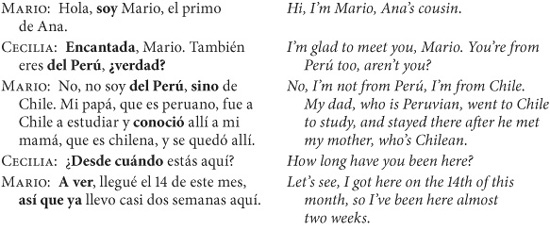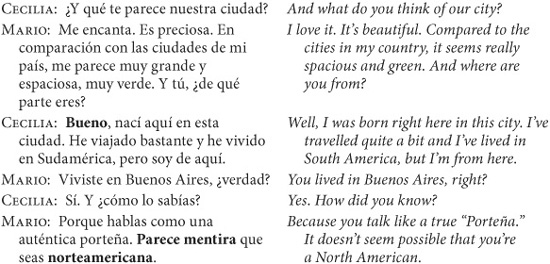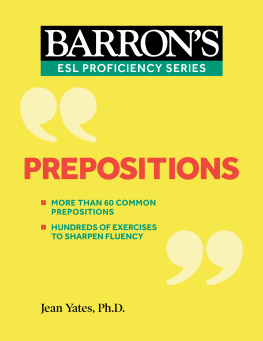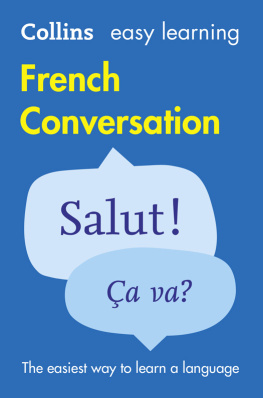PRACTICE MAKES PERFECT
Spanish Conversation
Jean Yates, Ph.D.

Copyright 2011 by The McGraw-Hill Companies, Inc. All rights reserved. Except as permitted under the United States Copyright Act of 1976, no part of this publication may be reproduced or distributed in any form or by any means, or stored in a database or retrieval system, without the prior written permission of the publisher. ISBN: 978-0-07-174477-5 MHID: 0-07-174477-0 The material in this eBook also appears in the print version of this title: ISBN: 978-0-07-174110-1, MHID: 0-07-174110-0. All trademarks are trademarks of their respective owners. Rather than put a trademark symbol after every occurrence of a trademarked name, we use names in an editorial fashion only, and to the benefit of the trademark owner, with no intention of infringement of the trademark.
Where such designations appear in this book, they have been printed with initial caps. McGraw-Hill eBooks are available at special quantity discounts to use as premiums and sales promotions, or for use in corporate training programs. To contact a representative please e-mail us at bulksales@mcgraw-hill.com. Trademarks: McGraw-Hill, the McGraw-Hill Publishing logo, Practice Makes Perfect, and related trade dress are trademarks or registered trademarks of The McGraw-Hill Companies and/or its affiliates in the United States and other countries and may not be used without written permission. All other trademarks are the property of their respective owners. TERMS OF USE This is a copyrighted work and The McGraw-Hill Companies, Inc. (McGraw-Hill) and its licensors reserve all rights in and to the work. (McGraw-Hill) and its licensors reserve all rights in and to the work.
Use of this work is subject to these terms. Except as permitted under the Copyright Act of 1976 and the right to store and retrieve one copy of the work, you may not decompile, disassemble, reverse engineer, reproduce, modify, create derivative works based upon, transmit, distribute, disseminate, sell, publish or sublicense the work or any part of it without McGraw-Hills prior consent. You may use the work for your own noncommercial and personal use; any other use of the work is strictly prohibited. Your right to use the work may be terminated if you fail to comply with these terms. THE WORK IS PROVIDED AS IS. McGRAW-HILL AND ITS LICENSORS MAKE NO GUARANTEES OR WARRANTIES AS TO THE ACCURACY, ADEQUACY OR COMPLETENESS OF OR RESULTS TO BE OBTAINED FROM USING THE WORK, INCLUDING ANY INFORMATION THAT CAN BE ACCESSED THROUGH THE WORK VIA HYPERLINK OR OTHERWISE, AND EXPRESSLY DISCLAIM ANY WARRANTY, EXPRESS OR IMPLIED, INCLUDING BUT NOT LIMITED TO IMPLIED WARRANTIES OF MERCHANTABILITY OR FITNESS FOR A PARTICULAR PURPOSE.
McGraw-Hill and its licensors do not warrant or guarantee that the functions contained in the work will meet your requirements or that its operation will be uninterrupted or error free. Neither McGraw-Hill nor its licensors shall be liable to you or anyone else for any inaccuracy, error or omission, regardless of cause, in the work or for any damages resulting there from. McGraw-Hill has no responsibility for the content of any information accessed through the work. Under no circumstances shall McGraw-Hill and/or its licensors be liable for any indirect, incidental, special, punitive, consequential or similar damages that result from the use of or inability to use the work, even if any of them has been advised of the possibility of such damages. This limitation of liability shall apply to any claim or cause whatsoever whether such claim or cause arises in contract, tort or otherwise.
Contents
Preface
Practice Makes Perfect: Spanish Conversation is designed to give you practice with the vocabulary and structures that are most often used in common types of informal conversations.
The book consists of twelve chapters, each one devoted to a particular conversational function. Each chapter begins with a typical conversation followed by a discussion of vocabulary and structures that are particularly important for the type of conversation in question. Certain expressions are repeated in other chapters so that you will become more familiar with them as they occur in different contexts. Following the discussion section are several sets of exercises to help you feel confident that you have understood the material. The exercises also give you practice in using new vocabulary and structures so that you will be able to use them in your own personal conversations. At the end of the book you will find two glossaries, the first listing alphabetically all the Spanish words in the book with their English translations, and the second listing the same words alphabetically in English with their Spanish translations.
Use this book, continue to practice your Spanish in conversations with your Spanish-speaking friends, and continue to learn and enjoy this beautiful language.
.1.
Introducing yourself and others
Conversation: Meeting at a party


Improving your conversation
Soy Mario
The most common way of introducing yourself or others is to use the verb
ser plus your name or the name of the person youre introducing. You can then add something else about the person.

Remember to use subject pronouns only if youre changing the subject of the conversation. If it is clear whom you are talking about, leave off the subject pronoun (
yo, usted, t, l, ella, nosotros, nosotras, ustedes, vosotros, vosotras, ellos, ellas).

But if someone walks into a room and says,
Quin es Jaime? (
Who is Jaime?), he would identify himself by saying,
Soy yo./Yo soy Jaime. (
Its me./Im Jaime.)
Encantada
This is a nice way of saying you are delighted or charmed to meet someone.
Of course, a male would say Encantado. You could also say:  And if the other person says Mucho gusto or Encantado or Es un placer first, you can answer, Igualmente (Me, too) or Elgusto es mo (The pleasure is mine).
And if the other person says Mucho gusto or Encantado or Es un placer first, you can answer, Igualmente (Me, too) or Elgusto es mo (The pleasure is mine).
Conocer
Conocer means
to meet someone for the first time, and also
to know, in the sense of
already having met someone or
having visited a place.









 Copyright 2011 by The McGraw-Hill Companies, Inc. All rights reserved. Except as permitted under the United States Copyright Act of 1976, no part of this publication may be reproduced or distributed in any form or by any means, or stored in a database or retrieval system, without the prior written permission of the publisher. ISBN: 978-0-07-174477-5 MHID: 0-07-174477-0 The material in this eBook also appears in the print version of this title: ISBN: 978-0-07-174110-1, MHID: 0-07-174110-0. All trademarks are trademarks of their respective owners. Rather than put a trademark symbol after every occurrence of a trademarked name, we use names in an editorial fashion only, and to the benefit of the trademark owner, with no intention of infringement of the trademark.
Copyright 2011 by The McGraw-Hill Companies, Inc. All rights reserved. Except as permitted under the United States Copyright Act of 1976, no part of this publication may be reproduced or distributed in any form or by any means, or stored in a database or retrieval system, without the prior written permission of the publisher. ISBN: 978-0-07-174477-5 MHID: 0-07-174477-0 The material in this eBook also appears in the print version of this title: ISBN: 978-0-07-174110-1, MHID: 0-07-174110-0. All trademarks are trademarks of their respective owners. Rather than put a trademark symbol after every occurrence of a trademarked name, we use names in an editorial fashion only, and to the benefit of the trademark owner, with no intention of infringement of the trademark. 

 Remember to use subject pronouns only if youre changing the subject of the conversation. If it is clear whom you are talking about, leave off the subject pronoun (yo, usted, t, l, ella, nosotros, nosotras, ustedes, vosotros, vosotras, ellos, ellas).
Remember to use subject pronouns only if youre changing the subject of the conversation. If it is clear whom you are talking about, leave off the subject pronoun (yo, usted, t, l, ella, nosotros, nosotras, ustedes, vosotros, vosotras, ellos, ellas).  But if someone walks into a room and says, Quin es Jaime? (Who is Jaime?), he would identify himself by saying, Soy yo./Yo soy Jaime. (Its me./Im Jaime.)
But if someone walks into a room and says, Quin es Jaime? (Who is Jaime?), he would identify himself by saying, Soy yo./Yo soy Jaime. (Its me./Im Jaime.)  And if the other person says Mucho gusto or Encantado or Es un placer first, you can answer, Igualmente (Me, too) or Elgusto es mo (The pleasure is mine).
And if the other person says Mucho gusto or Encantado or Es un placer first, you can answer, Igualmente (Me, too) or Elgusto es mo (The pleasure is mine).